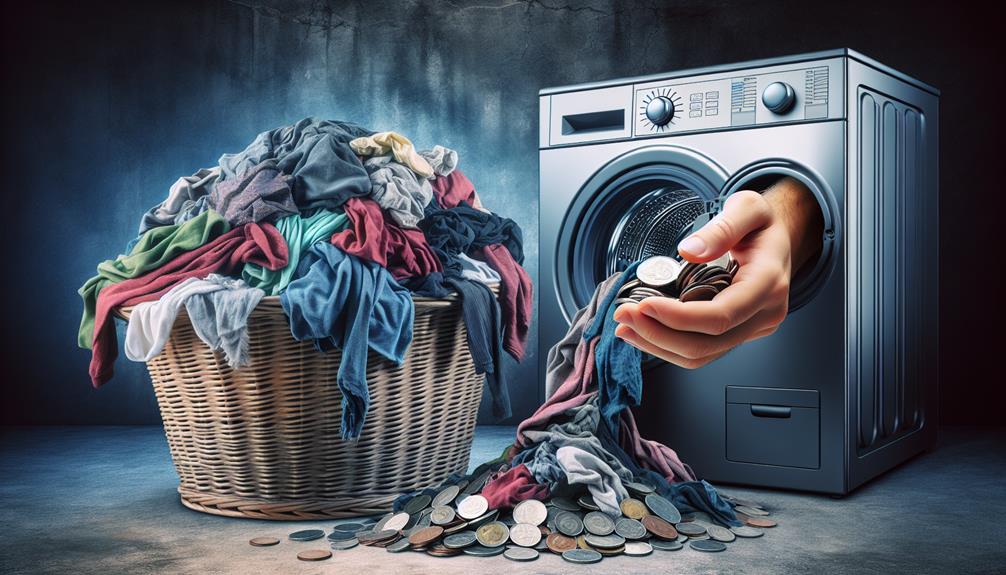You might be thinking that doing laundry at home is more cost-effective than using a laundromat, but have you considered all the factors in play?
The cost of doing laundry can vary based on several elements, such as your location, the type of washing machine you have, and even the detergent you use.
Before you make a decision, let's break down the average costs associated with laundry, explore some strategies to save money, and discover how to make your laundry routine more efficient.
Table of Contents
Key Takeaways
- Home laundry costs average $1.37 per load, while laundromats may charge $3, impacting overall expenses.
- Energy-efficient practices reduce electricity bills by $10 monthly, emphasizing savings with high-efficiency machines.
- Laundry supplies like detergent and fabric softeners can range from $0.10 to $0.30 per load, affecting costs.
- Opting for energy-efficient washers can save up to $45 annually, reduce water usage, and lower CO2 emissions significantly.
Average Home Laundry Costs
When it comes to average home laundry costs, managing expenses efficiently is crucial for saving money in the long run. The cost per load for doing laundry at home averages around $1.37, making it a more cost-effective option compared to laundromats where costs can range from $2 to $4 per load. However, recent data indicates a rise in laundromat costs to about $3 per load, which impacts the overall cost-effectiveness of doing laundry at home.
Factors such as electricity and water usage for washing machines and dryers contribute significantly to home laundry expenses. To reduce these costs, one can implement cost-effective strategies like washing full loads, using cold water, and air drying clothes whenever possible. Additionally, choosing budget-friendly laundry supplies, investing in energy-efficient machines, and adjusting laundry habits can further help in minimizing home laundry expenses.
Laundromat Cost Breakdown
Exploring the breakdown of laundromat costs provides valuable insights into understanding the expenses associated with this convenient laundry option. When considering the service cost per load at a laundromat, here's a breakdown to help you grasp the financial aspect more clearly:
- Base Cost: The typical range for a single load of laundry at a laundromat is between $2 to $4, with recent data pointing to an average cost of around $3 per load.
- Additional Services: Some laundromats offer extra services like detergent, fabric softener, and dryer sheets for an added cost, varying the final price per load.
- Machine Type: The type and size of the washing machine can influence the service cost. Larger machines designed for bulky items or extra-large loads might incur a higher fee per use.
- Time Efficiency: While the cost per load might be higher at a laundromat compared to home washing, the time saved by completing multiple loads simultaneously can be a significant factor in deciding between the two options.
Electricity Consumption Impact
As I consider the impact of electricity consumption on laundry costs, it becomes evident that washing machines and dryers play a significant role in household energy usage. Running these appliances can add around $10 to your monthly electricity bills. However, by adopting energy-efficient habits, you can lessen this financial burden. High-efficiency machines, adjusting load settings properly, and opting for air drying methods are smart ways to cut down on electricity usage and save money.
Implementing energy-efficient routines not only benefits your wallet but also has a positive environmental impact. By choosing to wash your clothes in cold water, using the appropriate load size, and making sure to clean the lint trap in your dryer regularly, you can reduce your carbon footprint while keeping your electricity costs in check.
Water Usage Considerations
When it comes to doing laundry, being mindful of water usage is crucial. Choosing high-efficiency machines and adjusting water levels based on load size can make a significant difference.
Employing eco-friendly practices like cold water washing not only saves money but also helps conserve energy and water resources.
Water Conservation Tips
Considering the average water usage for laundry and its impact on costs and sustainability, implementing water-saving techniques and adjusting settings can significantly reduce water consumption.
To conserve water during laundry, try the following tips:
- Use High-Efficiency Machines: Opt for machines designed to use less water per load.
- Adjust Water Levels: Match water levels to the size of the load to avoid unnecessary wastage.
- Choose Cold Water: Washing clothes in cold water not only saves energy but also reduces water usage.
- Adopt Energy-Efficient Routines: Utilize settings like shorter wash cycles and eco-friendly detergents to promote water conservation and lower utility bills.
Efficient Washing Machine
To maximize water efficiency when using an efficient washing machine, consider adjusting settings and habits to reduce water consumption and lower utility costs. When selecting a washing machine, opt for energy-efficient models that offer water-saving features. Additionally, adjusting the water level based on the laundry load size can further enhance water efficiency. By incorporating energy-efficient routines, such as washing full loads, using cold water, and selecting shorter wash cycles, you can reduce both water and energy consumption. Investing in a high-efficiency machine may require a higher initial cost but can lead to long-term savings on utility bills. Check out the table below for some key tips on maximizing water efficiency with your washing machine.
| Energy-Efficient Routine | Description |
|---|---|
| Wash Full Loads | Utilize the machine's full capacity |
| Use Cold Water | Reduce energy consumption while washing |
| Select Shorter Wash Cycles | Save water and energy by choosing shorter cycles |
| Adjust Water Level | Match water usage with the size of your laundry load |
Eco-Friendly Laundry Practices
Optimizing water usage in laundry practices can be achieved through eco-friendly approaches that encompass efficient machine settings and mindful product choices. To reduce water consumption, consider the following:
- Use high-efficiency machines and adjust load settings.
- On average, a standard laundry load consumes about 41 gallons of water.
- Adjust water levels based on load size to optimize water usage.
- Practice eco-friendly habits such as using cold water and air drying clothes.
Implementing these strategies, along with selecting eco-friendly detergents, can significantly reduce water waste and promote sustainable laundry practices while minimizing environmental impact.
Laundry Supplies Expenses
When it comes to managing laundry expenses, exploring the cost of various laundry supplies is essential for budget-conscious individuals. The cost of laundry supplies can significantly impact your overall laundry expenses. Detergent, for example, ranges from $0.10 to $0.30 per load. Additional items like fabric softeners and stain removers can add an extra $0.05 to $0.15 per load, while dryer sheets typically cost around $0.10 to $0.25 each. Bleach expenses vary from $0.05 to $0.15 per load.
To keep costs down, consider choosing cost-effective supplies and buying in bulk. This approach can help reduce your overall laundry expenses over time. By being mindful of the prices of these supplies and making strategic purchasing decisions, you can effectively manage your laundry budget without compromising on the cleanliness and freshness of your clothes. Remember, small savings on each load can add up to significant savings in the long run.
Cost per Load at Home
Hey there! Let's chat about the cost per load of laundry at home.
At around $1.37 per load on average, doing laundry at home can be a cost-effective option.
Stay tuned to discover some handy tips on how you can save on your laundry costs and make the most out of your home laundry setup!
Home Laundry Expenses
Home laundry expenses, at an average cost of $1.37 per load, can be influenced by factors such as electricity usage, water consumption, and the cost of laundry supplies. When considering home laundry costs, it's essential to optimize efficiency and make smart choices to save money.
Here are some tips to manage your home laundry expenses effectively:
- Energy-Efficient Practices: Washing full loads and using cold water can reduce energy consumption.
- Air Drying Clothes: Utilizing natural air for drying can lower electricity usage.
- Investing in Efficient Machines: Energy-efficient appliances can decrease long-term costs.
- Choosing Cost-Effective Supplies: Selecting budget-friendly detergents and fabric softeners can help cut down expenses.
Saving on Laundry Costs
To maximize savings on laundry costs, it's essential to implement efficient practices and make wise choices when it comes to managing home laundry expenses. With an average cost of $1.37 per load for home laundry compared to laundromats' $3 per load, cost-effective strategies become crucial.
Washing full loads, using cold water, and air drying clothes not only save energy and water but also reduce expenses. Opting for energy-efficient machines and adjusting laundry habits further cut down on electricity and water usage, ultimately saving on laundry costs.
Cost per Load at Laundromat
When considering the cost per load at a laundromat, it's important to note that prices typically range from $2 to $4, with recent data indicating an average of around $3 per load.
- $2 to $4 Range**: The cost per load can vary between $2 and $4, offering flexibility based on your budget.
- Average of $3: With an average cost of $3 per load, you can estimate your expenses more accurately.
- Variable Factors: Factors such as location, machine efficiency, and additional services can influence the final cost.
- Comparison with Home Laundry**: Although laundromats may charge more per load, they often provide larger machines for bulk washing.
Understanding the cost per load at a laundromat allows for better financial planning when choosing your laundry option.
Factors for Choosing Laundry Option
When deciding on a laundry option, it's essential to consider factors like cost and convenience. Understanding the expenses related to electricity, water, and supplies can help you make an informed choice.
Cost Considerations
Considering various factors such as load size, fabric type, and additional services can greatly influence the cost of your laundry. When determining the total cost, keep in mind:
- Load Size: Washing full loads can help maximize the efficiency of each cycle, reducing the cost per load.
- Fabric Type: Delicate fabrics may require special care, potentially increasing the cost of washing.
- Additional Services: Opting for services like folding or stain removal can add to the total cost.
- Energy and Water Usage: Being mindful of electricity and water consumption can impact the overall cost of doing laundry.
Convenience Factors
To select the best laundry option, consider the convenience factors that align with your needs and preferences. Factors like time savings, professional results, and convenience play a significant role in choosing a laundry service.
Busy schedules and delicate fabrics benefit greatly from wash and fold services due to their convenience and quality outcomes. Furthermore, laundry services that incorporate eco-friendly practices, energy-efficient machines, and reduced clothing wear not only provide convenience but also contribute positively to the environment.
Transparent pricing structures, discounts for recurring services, and special promotions can enhance customer satisfaction. Additionally, indicators such as timely delivery, positive cleanliness feedback, and loyal customer recommendations are crucial in evaluating the convenience factor of laundry services.
Cost-Effective Home Laundry Strategies
To save on costs and resources, washing full loads with cold water is a smart strategy for home laundry. Here are some cost-effective home laundry strategies to help you manage expenses efficiently:
- Bulk Purchases: Buying laundry supplies in bulk can lead to substantial savings over time. Look for deals on detergent, fabric softener, and dryer sheets to cut down on costs per use.
- Energy-Efficient Machines: Investing in high-efficiency appliances can lower energy consumption and reduce monthly electricity bills. Look for Energy Star certified washers and dryers for long-term savings.
- Adjust Water Levels: Be mindful of adjusting water levels based on load size. Using the appropriate amount of water for each cycle can help conserve resources and reduce water bills.
- Proper Load Settings: Utilize the proper load settings on your machines to maximize efficiency. Overloading machines can lead to longer cycles and higher energy usage, while using the correct settings can optimize performance and save resources.
Energy & Water Saving Tips
Implementing energy and water-saving practices in your laundry routine can lead to significant cost savings and environmental benefits. High-efficiency machines and adjusting water levels based on laundry load size are effective ways to reduce water consumption.
When it comes to energy usage, operating appliances like washing machines and dryers can add around $10 to your monthly electricity bill. To save money and reduce your environmental impact, consider washing full laundry loads, using cold water, and air drying clothes whenever possible.
These simple adjustments can help you cut down on energy and water usage, ultimately lowering your monthly costs. Choosing energy-efficient routines and appliances not only benefits your wallet but also contributes to long-term savings in laundry expenses.
Choosing Affordable Supplies
Transitioning from energy and water-saving tips, choosing affordable supplies for your laundry needs is a practical way to further reduce costs without compromising cleanliness and quality. When looking for budget-friendly options, consider using the following:
- Selecting Cost-Effective Detergent: Opt for affordable detergents that still provide effective cleaning power. Look for options that offer good quality at a lower price point per item.
- Choosing Affordable Fabric Softener: Invest in fabric softeners that are gentle on clothes and your wallet. There are many affordable options available that can help keep your clothes soft and static-free without breaking the bank.
- Opting for Low-Cost Stain Removers: Stains can be tough to tackle, but you don't need to spend a fortune on stain removers. Look for affordable alternatives that can effectively remove stains without costing a lot per item.
- Considering Bulk Discounts: Buying laundry supplies in bulk can often lead to significant savings. Seek out opportunities for bulk discounts on items like detergents, fabric softeners, and other essentials to reduce your overall laundry expenses.
Energy-Efficient Washing Machines
When considering ways to reduce both energy consumption and utility costs in your laundry routine, exploring the benefits of energy-efficient washing machines is a smart and practical choice. These machines can save up to 25% less energy compared to traditional models, making them a cost-effective option in the long run. Front-loading machines, in particular, are known for their energy efficiency, surpassing the top-loading counterparts in this aspect. Furthermore, high-efficiency machines not only consume less energy but also use less water, contributing to a reduction in water consumption per wash cycle.
Opting for an Energy Star certified washing machine can lead to significant savings, approximately around $45 per year on utility bills. While the initial investment in an energy-efficient washing machine might be slightly higher, the fold savings in energy costs over time and the positive environmental impact make it a worthwhile choice. By choosing an energy-efficient washing machine, you not only save money but also contribute to a greener and more sustainable future.
Frequently Asked Questions
How Much Does It Cost to Do 1 Load of Laundry?
In determining laundry costs, I consider factors like machine efficiency, load size, and habits. Cost-effective strategies, such as full loads, cold water, and air drying, help me save money and resources.
How Much Does It Cost to Do a Load of Washing?
Washing clothes typically costs about $1.37 per load at home and $2 to $4 at a laundromat. Efficient strategies like washing full loads, using cold water, and air drying help save money and resources.
Is It Cheaper to Do Laundry at Home or at a Laundromat?
At home or laundromat, cost depends on factors like convenience and load types. High-efficiency machines and adjusting habits can save money. Consider energy and water usage to choose the most economical option for your needs.
How Much Money Should I Bring to the Laundromat?
When heading to the laundromat, I'd suggest bringing $10 to $20 for a few loads. Costs can vary based on location and services needed. Bringing extra quarters for detergent or additional wash cycles is always handy.
- Finding the Perfect Pair of Rafaella Curvy Fit Gabardine Trousers - June 24, 2025
- The Benefits of Tencel Gabardine for Eco-Conscious Fashion - June 24, 2025
- A Closer Look at Yohji Yamamoto’s Signature Wool Gabardine Trousers - June 24, 2025







